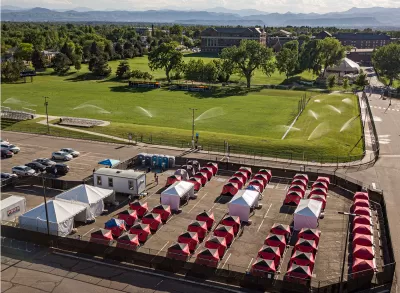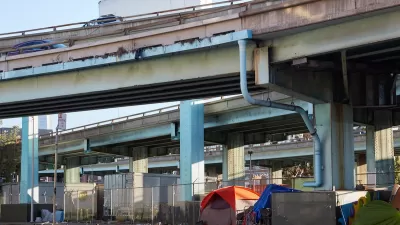Indigenous people make up a disproportionately high percentage of the unhoused population, but many programs designed to assist them don’t reach those most in need.

A Native-Inclusive Safe Outdoor Space (SOS) in Denver, Colorado offers shelter to unhoused Indigenous people, in advance of the first affordable housing complex designed for Indigenous residents which will break ground this year.
As Raksha Vasudevan explains in High Country News, “Indigenous people comprise 2.6% of America’s population, but in 2023, they accounted for 3.9% of those experiencing homelessness.” Vasudevan adds that “In Denver, they are overrepresented in the unhoused population by 400%.” Across the West, over 16,000 Indigenous people were homeless in 2023.
To get around federal prohibitions on using race as a criterion in housing programs, the housing authority in Portland, Oregon used HUD Indian Housing Block Grant funding to create affordable housing that prioritizes Indigenous people. Other organizations use proxy indicators such as “educational attainment, income, home value, utilization of social services, and free and reduced lunch status for children” to ensure Indigenous people get access to the services and housing they need.
According to Derrick Belgarde, Siletz and Chippewa-Cree, executive director of Chief Seattle Club, “There’s certain populations where it makes sense … to provide specifically for them.” Belgarde adds, “What the data shows is that you should be able to do that with Native Americans as well.”
FULL STORY: Can affordable housing for Indigenous communities work?

Maui's Vacation Rental Debate Turns Ugly
Verbal attacks, misinformation campaigns and fistfights plague a high-stakes debate to convert thousands of vacation rentals into long-term housing.

Planetizen Federal Action Tracker
A weekly monitor of how Trump’s orders and actions are impacting planners and planning in America.

In Urban Planning, AI Prompting Could be the New Design Thinking
Creativity has long been key to great urban design. What if we see AI as our new creative partner?

Pedestrian Deaths Drop, Remain Twice as High as in 2009
Fatalities declined by 4 percent in 2024, but the U.S. is still nowhere close to ‘Vision Zero.’

King County Supportive Housing Program Offers Hope for Unhoused Residents
The county is taking a ‘Housing First’ approach that prioritizes getting people into housing, then offering wraparound supportive services.

Researchers Use AI to Get Clearer Picture of US Housing
Analysts are using artificial intelligence to supercharge their research by allowing them to comb through data faster. Though these AI tools can be error prone, they save time and housing researchers are optimistic about the future.
Urban Design for Planners 1: Software Tools
This six-course series explores essential urban design concepts using open source software and equips planners with the tools they need to participate fully in the urban design process.
Planning for Universal Design
Learn the tools for implementing Universal Design in planning regulations.
planning NEXT
Appalachian Highlands Housing Partners
Mpact (founded as Rail~Volution)
City of Camden Redevelopment Agency
City of Astoria
City of Portland
City of Laramie





























